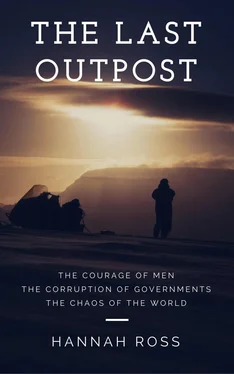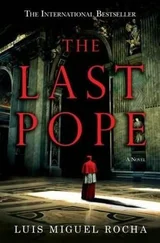Scott felt a flash of understanding mingled with anger. “In other words,” he said calmly, “the existence of these people is kept a secret, and their status as the indigenous owners of this land is denied them by the U.S. government, for the sake of land-grabbing and money.”
“No, no, no. Mr. Buckley, you are quite on a tangent here. Nobody is infringing upon the rights of the Anai. Hardly anyone is permitted to do as much as step within their valley or the bay beyond it, and even among the workers of the McMurdo station, no more than a handful of people are aware of their existence, so well-kept this secret is. During all the time since they were discovered, they have kept on living their lives as they did since the dawn of the world, without the least alteration or the tiniest bit of discomfort. The whole area, their whole civilization is a unique laboratory. Nobody will ever harm them… but it is better if they remain hidden from the prying eye of global organizations. When you get to know them more closely, you will agree with me, I’m sure.”
“But how did the government manage to keep these people a secret?” Scott persisted. “With the whole world globally visible through live satellite maps twenty-four hours a day, three hundred and sixty-five days a year, this just doesn’t seem possible.”
“Satellites don’t have a very clear view of this valley. You must have noticed it yourself — even while we were in the helicopter, it seemed no more than a dark chasm. And besides, the satellite coverage in this area is… imperfect.”
Scott understood. “The government sees to that,” he stated. Lindholm nodded.
“Would you like to step a bit further into the valley and take a closer look?”
Scott was caught. While the moralist in him still struggled, the scientist found the offer irresistible. He itched to see more of the valley and its mysterious people. Quite eagerly, he followed in the steps of Lindholm, who went on down the trail leading into the confines of the valley.
They were now quite close to some of the dwellings on the outer edge. They crouched behind a clump of the strange crooked little bushes, and watched the Anai go about their daily lives. A woman sat outside, shaping what looked like a clay pot and calling out to a brood of flaxen-haired youngsters. Two men, deep in eager conversation, were apparently comparing the tools or weapons each held in his hand — they could have been harpoons or spears.
Suddenly, a dangerously swift whoosh made Scott fall upon the ground. A throw-spear struck the earth between him and Lindholm and quivered ominously. Then there was a gale of laughter. To Scott’s surprise, Anders was grinning as well.
“They have discovered us,” he said without the least bit of apprehension.
Lindholm walked out from behind the bushes, and Scott straightened up, brushing dirt from his clothes. No less than five or six Anai men were approaching them, all still chuckling as if at a very good joke. One of them, a handsome young strapping fellow, bent to retrieve the throw-spear, and Scott was struck by his fine build and the graceful fluidity of all his motions. To his surprise, the young man proceeded to clap Lindholm on the shoulder, and both men smiled.
“Anders,” Scott heard from the young man’s lips, pronounced with thick indescribable accent, but very melodiously.
“Hello, Ri Omrek,” Lindholm said. “Some of them have picked up some English from us,” he uttered a quick, quiet explanation in Scott’s direction.
The young man was looking at Scott with evident curiosity. “This is Scott Buckley. He is a friend,” Lindholm said in a slow, clear voice. The Anai men seemed to find this sufficient recommendation. They approached Scott and clapped his shoulder, or clasped his arm, as was evidently their custom in lieu of shaking hands.
Anders Lindholm and other researchers, apparently, were not enough of a novelty to raise more than passing interest around the settlement. The men, with friendly waves and smiles, dispersed to their various affairs, and only Ri Omrek kept by their side, measuring Scott up and down. Scott noted the exotic handsomeness of his features. The Anai were as white as the people of Scandinavia, with fair skin and hair in all shades of blonde, reddish and light brown, and eyes green and blue and grey, but their cheekbones were wide and their eyes shaded by heavy lids like those of the Eskimo people — this, Scott fleetingly thought, was probably the effect of the polar climate.
“You think we not see you. We see you coming from afar,” Ri Omrek said, looking very pleased with himself. Lindholm chuckled.
“I should have known better than to try getting close unnoticed,” he said.
Scott looked with fascination at the throw-spear still held in the Anai man’s hand. It was beautifully made, with a head of finely worked flint and a thin, well-polished wooden shaft probably made of the same arborescent plants they had hidden behind. The flint had some shiny particles that caught and reflected the light.
“Come and sit a while,” Ri Omrek invited.
“We don’t have much time. Must head back soon,” Lindholm said. Scott was too dazed to speak, so engaged he was in observing the young handsome alien that walked by their side as they were heading in the direction of the village.
“Shame. But a bit of food and drink, yes? Ki Tahan will be glad. Ki Tahan my… sister,” he cast for the right word, looking at Scott, who merely nodded.
“Ki Tahan is the chieftainness of the village,” Lindholm explained to Scott out of the corner of his mouth.
They passed several of the stone houses. Near each of those, people were at their usual business, and didn’t give them more than a fleeting curious look. Some were digging and tending what looked like fields and vegetable patches — something was definitely growing there, and Scott was itching to examine the crops that would make it in such remote and unique conditions, but realized it was probably not the right time. There were green leaves poking in neat rows above the ground, and stalks of what looked like wild wheat or some other grain. Whatever these people grew, it had to be annual, and to complete its life cycle within the one long Antarctic day.
There were some small paddocks near some of the houses, and within them Scott noticed some kind of very strange-looking, fat waterfowl which were clearly domesticated. At another spot, a young woman was sitting down, and it looked like she was weaving. Her garments did not look like they were made entirely of skins, and Scott surmised that the local grasses must provide the Anai with the possibility to make some sort of fiber.
Finally, Ri Omrek stopped next to one of the houses. “Here,” he said, “home of Ki Tahan. I live here too.”
There was nothing about the house of the chieftainness to distinguish it from the other houses of the village — it was plain stonework, held together by, Scott guessed, some sort of local clay. A leather flap was tied snugly across the entrance, and there was no smoke rising up, which gave him a notion that nobody was home. Their Anai guide was evidently thinking along the same lines.
“Ki Tahan out,” he said. “She and her son go to the river, fish. Must be back soon.”
A river! Yes, there must, of course, be a river in a valley so warm, on a continent so full of freshwater. The lust of discovery nearly drove Scott mad. He didn’t know where to look first. He could have rushed to this river and taken notes for ages and ages. A body of running water in the middle of Antarctica — who knows what unique specimens can be found there!
In the meantime, Ri Omrek tied up the flap and stepped back, inviting them in with a gesture. “Welcome,” he said. And, with the trepidation of a man stepping into a whole new world, Scott bent his head to duck under the low frame, and walked in after Lindholm.
Читать дальше












